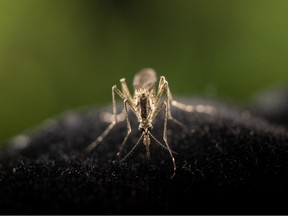Here’s why there’s a mosquito boom in Metro Vancouver

If you feel like a walking buffet for mosquitoes recently you’re not alone.

Article content
If you feel like a walking buffet for mosquitoes recently, you’re not alone.
After a fairly quiet season, Metro Vancouverites have seen an explosion in the number of the bloodsucking bugs. That’s due to the rainfall after a drought, said Ben Matthews, an assistant professor of zoology at the University of B.C.
Article content
“It’s an unusual pattern that has to do with how our rain came — or didn’t come — for a while,” he said.
Advertisement 2
Article content
In previous summers, mosquitoes typically emerge in the spring and then steadily hatch throughout the summer. This year, however, “we went from zero to 100 in a period of about a week.”
After a dry May and June, recent rainfall has prompted a late-season bug boom.
The last significant soggy weather was about 2 1/2 weeks ago and that synchronizes with the spike in the mosquito population currently plaguing residents, noted Matthews: “We’re getting the effects of the rain a couple weeks ago.”
Even the pros at the CPKC Women’s Open at the Shaughnessy Golf and Country Club have remarked on the presence of the pesky bloodsuckers.
Asked in an interview what the Vancouver course brings to the table, top-rated LPGA player Nelly Korda cited the size of the greens, tightness off the tee and “a side of a lot of mosquitoes.”
Mosquitoes need standing water like ponds and puddles to breed and hatch their eggs. They also need warm weather to complete their development from larvae and pupa to adult — a process that takes seven to 10 days.
B.C. has more than 50 species of mosquitoes. Matthews’ mosquito lab at UBC conducts research on how the insects use their sense of smell and taste to blood-feed and select suitable sites for their eggs.
Article content
Advertisement 3
Article content
In a lab setting, mosquitoes have a life span of several months. In the wild, they usually last days or weeks due to predation by insects and birds as well as annoyed humans fed up with itchy bites.
“We are defensive hosts,” said Matthews. “We fight back so every time they get a blood meal they are putting their lives in danger.”
Only female mosquitoes suck blood, using it to produce protein needed to reproduce.
Matthews believes the current spate of mosquitoes will stay active for a few more weeks before dying off. But more could come, depending on the weather.
“If we get more rain, we might see a pattern similar to what we got right now,” he said.
If the rains hold off and conditions stay dry, mosquitoes can’t lay their eggs. But they can also wait it out.
Some species can hang out as larvae or pupa and “as long as it doesn’t get too cold where they are, they can sit and wait till the rains do come in the spring,” said Matthews.
To minimize mosquitoes in your home or neighbourhood, prevent water from accumulating or sitting, not just in puddles, but also in receptacles like gutters or bird baths.
Advertisement 4
Article content
To avoid mosquito bites, wear long pants and long sleeves. Consider using chemical repellents, which are more long-lasting and effective than natural remedies, said Matthews.
Another low-tech tip: Use a fan.
“Mosquitoes are not strong flyers, so moving air around you can be fairly effective,” he said.
-

B.C. educators prepare for the ‘problems and promise’ of AI apps like ChatGPT
-

‘I have nowhere to go’: B.C. is Canada’s eviction capital, new research shows
Summer subscription sale: Our in-depth journalism is possible thanks to the support of our subscribers. For a limited time, you can get full online access to the Vancouver Sun and The Province, along with the National Post and 13 other Canadian news sites, for just $40 for one year or $1 a week for 52 weeks. Support our journalism by subscribing today: The Vancouver Sun | The Province.






Comments
Postmedia is committed to maintaining a lively but civil forum for discussion and encourage all readers to share their views on our articles. Comments may take up to an hour for moderation before appearing on the site. We ask you to keep your comments relevant and respectful. We have enabled email notifications—you will now receive an email if you receive a reply to your comment, there is an update to a comment thread you follow or if a user you follow comments. Visit our Community Guidelines for more information and details on how to adjust your email settings.
Join the Conversation